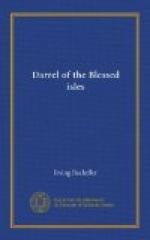Next day Trove went home. He took with him many a souvenir of his first term, including a scarf that Polly had knit for him, and the curious things he took from the Frenchman Leblanc, and which he retained partly because they were curious and partly because Mrs. Leblanc had been anxious to get rid of them. He soon rejoined his class at Hillsborough, having kept abreast of it in history and mathematics by work after school and over the week’s end. He was content to fall behind in the classics, for they were easy, and in them his arrears gave him no terror. Walking for exercise, he laid the plan of his tale and had written some bits of verse. Of an evening he went often to the Sign of the Dial, and there read his lines and got friendly but severe criticism. He came into the shop one evening, his “Horace” under his arm.
“‘Maecenas, atavis, edite regibus’” Trove chanted, pausing to recall the lines.
The tinker turned quickly. “’O et presidium et duice decus meum,’” he quoted, never stopping until he had finished She ode.
“Is there anything you do not know?” Trove inquired.
“Much,” said the tinker, “including the depth o’ me own folly. A man that displays knowledge hath need o’ more.”
Indeed, Trove rarely came for a talk with Darrel when he failed to discover something new in him—a further reach of thought and sympathy or some unsuspected treasure of knowledge. The tinker loved a laugh and would often search his memory for some phrase of bard or philosopher apt enough to provoke it. Of his great store of knowledge he made no vainer use.
Trove had been overworking; and about the middle of June they went for a week in the woods together. They walked to Allen’s the first day, and, after a brief visit there, went off in the deep woods, camping on a pond in thick-timbered hills. Coming to the lilied shore, they sat down a while to rest. A hawk was sailing high above the still water. Crows began to call in the tree-tops. An eagle sat on a dead pine at the water’s edge and seemed to be peering down at his own shadow. Two deer stood in a marsh on the farther shore, looking over at them. Near by were the bones of some animal, and the fresh footprints of a painter. Sounds echoed far in the hush of the unbroken wilderness.
“See, boy,” said Darrel, with a little gesture of his right hand, “the theatre o’ the woods! See the sloping hills, tree above tree, like winding galleries. Here is a coliseum old, past reckoning. Why, boy, long before men saw the Seven Hills it was old. Yet see how new it is—how fresh its colour, how strong its timbers! See the many seats, each with a good view, an’ the multitude o’ the people, yet most o’ them are hidden. Ten thousand eyes are looking down upon us. Tragedies and comedies o’ the forest are enacted here. Many a thrilling scene has held the stage—the spent deer swimming for his life, the painter stalking his prey or leaping on it.”




